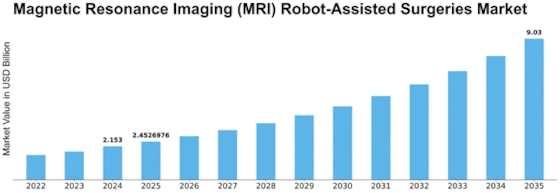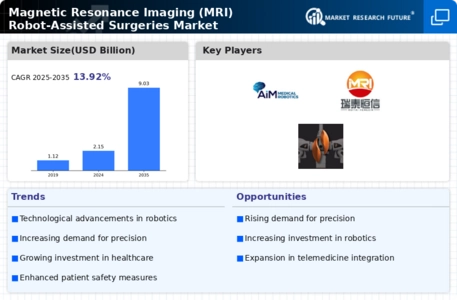-
EXECUTIVE SUMMARY
-
MARKET INTRODUCTION
-
Definition
-
Scope of the Study
- Research Objective
- Assumptions
- Limitations
-
RESEARCH METHODOLOGY
-
Overview
-
Data Mining
-
Secondary Research
-
Primary Research
- Primary Interviews and Information Gathering Process
- Breakdown of Primary Respondents
-
Forecasting Application
-
Market Size Estimation
- Bottom-Up Approach
- Top-Down Approach
-
Data Triangulation
-
Validation
-
MARKET DYNAMICS
-
Overview
-
Drivers
-
Restraints
-
Opportunities
-
MARKET FACTOR ANALYSIS
-
Value Chain Analysis
-
Porter’s Five Forces Analysis
- Bargaining Power of Suppliers
- Bargaining Power of Buyers
- Threat of New Entrants
- Threat of Substitutes
- Intensity of Rivalry
-
COVID-19 Impact Analysis
- Market Impact Analysis
- Regional Impact
- Opportunity and Threat Analysis
-
GLOBAL MAGNETIC RESONANCE IMAGING (MRI) Magnetic Resonance Imaging MRI Robot-Assisted Surgeries Market, BY PRODUCT
-
Overview
-
Sensors
-
Actuators
-
Robots
-
GLOBAL MAGNETIC RESONANCE IMAGING (MRI) Magnetic Resonance Imaging MRI Robot-Assisted Surgeries Market, BY APPLICATION
-
Overview
-
Oncology Surgery
- Prostate Biopsy & Brachytherapy
- Brain Biopsy & Intervention
- Breast Cancer Diagnosis & Intervention
- Liver Cancer Diagnosis & Intervention
-
Neurological Surgery
-
Cardiovascular Surgery
-
GLOBAL MAGNETIC RESONANCE IMAGING (MRI) Magnetic Resonance Imaging MRI Robot-Assisted Surgeries Market, BY END USER
-
Overview
-
Hospitals
-
Ambulatory Surgical Centers
-
Specialty Clinics
-
GLOBAL MAGNETIC RESONANCE IMAGING (MRI) Magnetic Resonance Imaging MRI Robot-Assisted Surgeries Market, BY REGION
-
Overview
-
North America
- US
- Canada
-
Europe
- Germany
- France
- UK
- Italy
- Spain
- Rest of Europe
-
Asia-Pacific
- China
- India
- Japan
- South Korea
- Australia
- Rest of Asia-Pacific
-
Rest of the World
- Middle East
- Africa
- Latin America
-
COMPANY LANDSCAPE
-
Overview
-
Competitive Analysis
-
Market Share Analysis
-
Major Growth Strategy in the Global Magnetic Resonance Imaging (MRI) Robot-Assisted Surgeries Market,
-
Competitive Benchmarking
-
Leading Players in Terms of Number of Developments in the Global Magnetic Resonance Imaging (MRI) Robot-Assisted Surgeries Market,
-
Key developments and Growth Strategies
- New Product Launch/Service Deployment
- Merger & Acquisitions
- Joint Ventures
-
Major Players Financial Matrix
- Sales & Operating Income, 2022
- Major Players R&D Expenditure. 2022
-
COMPANY PROFILES
-
AiM Medical Robotics
- Company Overview
- Financial Overview
- Products Offered
- Key Developments
- SWOT Analysis
- Key Strategies
-
IMRIS
- Company Overview
- Financial Overview
- Products Offered
- Key Developments
- SWOT Analysis
- Key Strategies
-
Monteris Medical
- Company Overview
- Financial Overview
- Products Offered
- Key Developments
- SWOT Analysis
- Key Strategies
-
Machnet Medical Robotics B.V
- Company Overview
- Financial Overview
- Products Offered
- Key Developments
- SWOT Analysis
- Key Strategies
-
Neuro42, Inc.
- Company Overview
- Financial Overview
- Products Offered
- Key Developments
- SWOT Analysis
- Key Strategies
-
ACCURAY INCORPORATED
- Company Overview
- Financial Overview
- Products Offered
- Key Developments
- SWOT Analysis
- Key Strategies
-
Stereotaxis Inc.
- Company Overview
- Financial Overview
- Products Offered
- Key Developments
- SWOT Analysis
- Key Strategies
-
APPENDIX
-
References
-
Related Reports
-
-
LIST OF TABLES
-
GLOBAL MAGNETIC RESONANCE IMAGING (MRI) ROBOT-ASSISTED SURGERIES MARKET, SYNOPSIS, 2019–2030
-
GLOBAL MAGNETIC RESONANCE IMAGING (MRI) ROBOT-ASSISTED SURGERIES MARKET, ESTIMATES & FORECAST, 2019–2030 (USD MILLION)
-
GLOBAL MAGNETIC RESONANCE IMAGING (MRI) Magnetic Resonance Imaging MRI Robot-Assisted Surgeries Market, BY PRODUCT, 2019–2030 (USD MILLION)
-
GLOBAL MAGNETIC RESONANCE IMAGING (MRI) Magnetic Resonance Imaging MRI Robot-Assisted Surgeries Market, BY APPLICATION, 2019–2030 (USD MILLION)
-
GLOBAL MAGNETIC RESONANCE IMAGING (MRI) Magnetic Resonance Imaging MRI Robot-Assisted Surgeries Market, BY END USER, 2019–2030 (USD MILLION)
-
NORTH AMERICA: MAGNETIC RESONANCE IMAGING (MRI) Magnetic Resonance Imaging MRI Robot-Assisted Surgeries Market, BY PRODUCT, 2019–2030 (USD MILLION)
-
NORTH AMERICA: MAGNETIC RESONANCE IMAGING (MRI) Magnetic Resonance Imaging MRI Robot-Assisted Surgeries Market, BY APPLICATION, 2019–2030 (USD MILLION)
-
NORTH AMERICA: MAGNETIC RESONANCE IMAGING (MRI) Magnetic Resonance Imaging MRI Robot-Assisted Surgeries Market, BY END USER, 2019–2030 (USD MILLION)
-
US: MAGNETIC RESONANCE IMAGING (MRI) Magnetic Resonance Imaging MRI Robot-Assisted Surgeries Market, BY PRODUCT, 2019–2030 (USD MILLION)
-
US: MAGNETIC RESONANCE IMAGING (MRI) Magnetic Resonance Imaging MRI Robot-Assisted Surgeries Market, BY APPLICATION, 2019–2030 (USD MILLION)
-
US: MAGNETIC RESONANCE IMAGING (MRI) Magnetic Resonance Imaging MRI Robot-Assisted Surgeries Market, BY END USER, 2019–2030 (USD MILLION)
-
CANADA: MAGNETIC RESONANCE IMAGING (MRI) Magnetic Resonance Imaging MRI Robot-Assisted Surgeries Market, BY PRODUCT, 2019–2030 (USD MILLION)
-
CANADA: MAGNETIC RESONANCE IMAGING (MRI) Magnetic Resonance Imaging MRI Robot-Assisted Surgeries Market, BY APPLICATION, 2019–2030 (USD MILLION)
-
CANADA: MAGNETIC RESONANCE IMAGING (MRI) Magnetic Resonance Imaging MRI Robot-Assisted Surgeries Market, BY END USER, 2019–2030 (USD MILLION)
-
EUROPE: MAGNETIC RESONANCE IMAGING (MRI) Magnetic Resonance Imaging MRI Robot-Assisted Surgeries Market, BY PRODUCT, 2019–2030 (USD MILLION)
-
EUROPE: MAGNETIC RESONANCE IMAGING (MRI) Magnetic Resonance Imaging MRI Robot-Assisted Surgeries Market, BY APPLICATION, 2019–2030 (USD MILLION)
-
EUROPE: MAGNETIC RESONANCE IMAGING (MRI) Magnetic Resonance Imaging MRI Robot-Assisted Surgeries Market, BY END USER, 2019–2030 (USD MILLION)
-
GERMANY: MAGNETIC RESONANCE IMAGING (MRI) Magnetic Resonance Imaging MRI Robot-Assisted Surgeries Market, BY PRODUCT, 2019–2030 (USD MILLION)
-
GERMANY: MAGNETIC RESONANCE IMAGING (MRI) Magnetic Resonance Imaging MRI Robot-Assisted Surgeries Market, BY APPLICATION, 2019–2030 (USD MILLION)
-
GERMANY: MAGNETIC RESONANCE IMAGING (MRI) Magnetic Resonance Imaging MRI Robot-Assisted Surgeries Market, BY END USER, 2019–2030 (USD MILLION)
-
FRANCE: MAGNETIC RESONANCE IMAGING (MRI) Magnetic Resonance Imaging MRI Robot-Assisted Surgeries Market, BY PRODUCT, 2019–2030 (USD MILLION)
-
FRANCE: MAGNETIC RESONANCE IMAGING (MRI) Magnetic Resonance Imaging MRI Robot-Assisted Surgeries Market, BY APPLICATION, 2019–2030 (USD MILLION)
-
FRANCE: MAGNETIC RESONANCE IMAGING (MRI) Magnetic Resonance Imaging MRI Robot-Assisted Surgeries Market, BY END USER, 2019–2030 (USD MILLION)
-
ITALY: MAGNETIC RESONANCE IMAGING (MRI) Magnetic Resonance Imaging MRI Robot-Assisted Surgeries Market, BY PRODUCT, 2019–2030 (USD MILLION)
-
ITALY: MAGNETIC RESONANCE IMAGING (MRI) Magnetic Resonance Imaging MRI Robot-Assisted Surgeries Market, BY APPLICATION, 2019–2030 (USD MILLION)
-
ITALY: MAGNETIC RESONANCE IMAGING (MRI) Magnetic Resonance Imaging MRI Robot-Assisted Surgeries Market, BY END USER, 2019–2030 (USD MILLION)
-
SPAIN: MAGNETIC RESONANCE IMAGING (MRI) Magnetic Resonance Imaging MRI Robot-Assisted Surgeries Market, BY PRODUCT, 2019–2030 (USD MILLION)
-
SPAIN: MAGNETIC RESONANCE IMAGING (MRI) Magnetic Resonance Imaging MRI Robot-Assisted Surgeries Market, BY APPLICATION, 2019–2030 (USD MILLION)
-
SPAIN: MAGNETIC RESONANCE IMAGING (MRI) Magnetic Resonance Imaging MRI Robot-Assisted Surgeries Market, BY END USER, 2019–2030 (USD MILLION)
-
UK: MAGNETIC RESONANCE IMAGING (MRI) Magnetic Resonance Imaging MRI Robot-Assisted Surgeries Market, BY PRODUCT, 2019–2030 (USD MILLION)
-
UK: MAGNETIC RESONANCE IMAGING (MRI) Magnetic Resonance Imaging MRI Robot-Assisted Surgeries Market, BY APPLICATION, 2019–2030 (USD MILLION)
-
UK: MAGNETIC RESONANCE IMAGING (MRI) Magnetic Resonance Imaging MRI Robot-Assisted Surgeries Market, BY AGE GROUP, 2019–2030 (USD MILLION)
-
REST OF EUROPE: MAGNETIC RESONANCE IMAGING (MRI) Magnetic Resonance Imaging MRI Robot-Assisted Surgeries Market, BY PRODUCT, 2019–2030 (USD MILLION)
-
REST OF EUROPE: MAGNETIC RESONANCE IMAGING (MRI) Magnetic Resonance Imaging MRI Robot-Assisted Surgeries Market, BY APPLICATION, 2019–2030 (USD MILLION)
-
REST OF EUROPE: MAGNETIC RESONANCE IMAGING (MRI) Magnetic Resonance Imaging MRI Robot-Assisted Surgeries Market, BY END USER, 2019–2030 (USD MILLION)
-
ASIA-PACIFIC: MAGNETIC RESONANCE IMAGING (MRI) Magnetic Resonance Imaging MRI Robot-Assisted Surgeries Market, BY PRODUCT, 2019–2030 (USD MILLION)
-
ASIA-PACIFIC: MAGNETIC RESONANCE IMAGING (MRI) Magnetic Resonance Imaging MRI Robot-Assisted Surgeries Market, BY APPLICATION, 2019–2030 (USD MILLION)
-
ASIA-PACIFIC: MAGNETIC RESONANCE IMAGING (MRI) Magnetic Resonance Imaging MRI Robot-Assisted Surgeries Market, BY END USER, 2019–2030 (USD MILLION)
-
JAPAN: MAGNETIC RESONANCE IMAGING (MRI) Magnetic Resonance Imaging MRI Robot-Assisted Surgeries Market, BY PRODUCT, 2019–2030 (USD MILLION)
-
JAPAN: MAGNETIC RESONANCE IMAGING (MRI) Magnetic Resonance Imaging MRI Robot-Assisted Surgeries Market, BY APPLICATION, 2019–2030 (USD MILLION)
-
JAPAN: MAGNETIC RESONANCE IMAGING (MRI) Magnetic Resonance Imaging MRI Robot-Assisted Surgeries Market, BY END USER, 2019–2030 (USD MILLION)
-
CHINA: MAGNETIC RESONANCE IMAGING (MRI) Magnetic Resonance Imaging MRI Robot-Assisted Surgeries Market, BY PRODUCT, 2019–2030 (USD MILLION)
-
CHINA: MAGNETIC RESONANCE IMAGING (MRI) Magnetic Resonance Imaging MRI Robot-Assisted Surgeries Market, BY APPLICATION, 2019–2030 (USD MILLION)
-
CHINA: MAGNETIC RESONANCE IMAGING (MRI) Magnetic Resonance Imaging MRI Robot-Assisted Surgeries Market, BY END USER, 2019–2030 (USD MILLION)
-
INDIA: MAGNETIC RESONANCE IMAGING (MRI) Magnetic Resonance Imaging MRI Robot-Assisted Surgeries Market, BY PRODUCT, 2019–2030 (USD MILLION)
-
INDIA: MAGNETIC RESONANCE IMAGING (MRI) Magnetic Resonance Imaging MRI Robot-Assisted Surgeries Market, BY APPLICATION, 2019–2030 (USD MILLION)
-
INDIA: MAGNETIC RESONANCE IMAGING (MRI) Magnetic Resonance Imaging MRI Robot-Assisted Surgeries Market, BY END USER, 2019–2030 (USD MILLION)
-
AUSTRALIA: MAGNETIC RESONANCE IMAGING (MRI) Magnetic Resonance Imaging MRI Robot-Assisted Surgeries Market, BY PRODUCT, 2019–2030 (USD MILLION)
-
AUSTRALIA: MAGNETIC RESONANCE IMAGING (MRI) Magnetic Resonance Imaging MRI Robot-Assisted Surgeries Market, BY APPLICATION, 2019–2030 (USD MILLION)
-
AUSTRALIA: MAGNETIC RESONANCE IMAGING (MRI) Magnetic Resonance Imaging MRI Robot-Assisted Surgeries Market, BY END USER, 2019–2030 (USD MILLION)
-
SOUTH KOREA: MAGNETIC RESONANCE IMAGING (MRI) Magnetic Resonance Imaging MRI Robot-Assisted Surgeries Market, BY PRODUCT, 2019–2030 (USD MILLION)
-
SOUTH KOREA: MAGNETIC RESONANCE IMAGING (MRI) Magnetic Resonance Imaging MRI Robot-Assisted Surgeries Market, BY APPLICATION, 2019–2030 (USD MILLION)
-
SOUTH KOREA: MAGNETIC RESONANCE IMAGING (MRI) Magnetic Resonance Imaging MRI Robot-Assisted Surgeries Market, BY END USER, 2019–2030 (USD MILLION)
-
REST OF ASIA-PACIFIC: MAGNETIC RESONANCE IMAGING (MRI) Magnetic Resonance Imaging MRI Robot-Assisted Surgeries Market, BY PRODUCT, 2019–2030 (USD MILLION)
-
REST OF ASIA-PACIFIC: MAGNETIC RESONANCE IMAGING (MRI) Magnetic Resonance Imaging MRI Robot-Assisted Surgeries Market, BY APPLICATION, 2019–2030 (USD MILLION)
-
REST OF ASIA-PACIFIC: MAGNETIC RESONANCE IMAGING (MRI) Magnetic Resonance Imaging MRI Robot-Assisted Surgeries Market, BY END USER, 2019–2030 (USD MILLION)
-
REST OF THE WORLD: MAGNETIC RESONANCE IMAGING (MRI) Magnetic Resonance Imaging MRI Robot-Assisted Surgeries Market, BY PRODUCT, 2019–2030 (USD MILLION)
-
REST OF THE WORLD: MAGNETIC RESONANCE IMAGING (MRI) Magnetic Resonance Imaging MRI Robot-Assisted Surgeries Market, BY APPLICATION, 2019–2030 (USD MILLION)
-
REST OF THE WORLD: MAGNETIC RESONANCE IMAGING (MRI) Magnetic Resonance Imaging MRI Robot-Assisted Surgeries Market, BY END USER, 2019–2030 (USD MILLION)
-
MIDDLE EAST: MAGNETIC RESONANCE IMAGING (MRI) Magnetic Resonance Imaging MRI Robot-Assisted Surgeries Market, BY PRODUCT, 2019–2030 (USD MILLION)
-
MIDDLE EAST: MAGNETIC RESONANCE IMAGING (MRI) Magnetic Resonance Imaging MRI Robot-Assisted Surgeries Market, BY APPLICATION, 2019–2030 (USD MILLION)
-
MIDDLE EAST: MAGNETIC RESONANCE IMAGING (MRI) Magnetic Resonance Imaging MRI Robot-Assisted Surgeries Market, BY END USER, 2019–2030 (USD MILLION)
-
AFRICA: MAGNETIC RESONANCE IMAGING (MRI) Magnetic Resonance Imaging MRI Robot-Assisted Surgeries Market, BY PRODUCT, 2019–2030 (USD MILLION)
-
AFRICA: MAGNETIC RESONANCE IMAGING (MRI) Magnetic Resonance Imaging MRI Robot-Assisted Surgeries Market, BY APPLICATION, 2019–2030 (USD MILLION)
-
AFRICA: MAGNETIC RESONANCE IMAGING (MRI) Magnetic Resonance Imaging MRI Robot-Assisted Surgeries Market, BY END USER, 2019–2030 (USD MILLION)
-
LATIN AMERICA: MAGNETIC RESONANCE IMAGING (MRI) Magnetic Resonance Imaging MRI Robot-Assisted Surgeries Market, BY PRODUCT, 2019–2030 (USD MILLION)
-
LATIN AMERICA: MAGNETIC RESONANCE IMAGING (MRI) Magnetic Resonance Imaging MRI Robot-Assisted Surgeries Market, BY APPLICATION, 2019–2030 (USD MILLION)
-
LATIN AMERICA: MAGNETIC RESONANCE IMAGING (MRI) Magnetic Resonance Imaging MRI Robot-Assisted Surgeries Market, BY END USER, 2019–2030 (USD MILLION)
-
LIST OF FIGURES
-
RESEARCH PROCESS
-
MARKET STRUCTURE FOR THE GLOBAL MAGNETIC RESONANCE IMAGING (MRI) ROBOT-ASSISTED SURGERIES MARKET
-
MARKET DYNAMICS FOR THE GLOBAL MAGNETIC RESONANCE IMAGING (MRI) ROBOT-ASSISTED SURGERIES MARKET
-
GLOBAL MAGNETIC RESONANCE IMAGING (MRI) ROBOT-ASSISTED SURGERIES MARKET, SHARE (%), BY PRODUCT, 2022
-
GLOBAL MAGNETIC RESONANCE IMAGING (MRI) ROBOT-ASSISTED SURGERIES MARKET, SHARE (%), BY APPLICATION, 2022
-
GLOBAL MAGNETIC RESONANCE IMAGING (MRI) ROBOT-ASSISTED SURGERIES MARKET, SHARE (%), BY END USER, 2022
-
GLOBAL MAGNETIC RESONANCE IMAGING (MRI) ROBOT-ASSISTED SURGERIES MARKET, SHARE (%), BY REGION, 2022
-
NORTH AMERICA: MAGNETIC RESONANCE IMAGING (MRI) ROBOT-ASSISTED SURGERIES MARKET, SHARE (%), BY REGION, 2022
-
EUROPE: MAGNETIC RESONANCE IMAGING (MRI) ROBOT-ASSISTED SURGERIES MARKET, SHARE (%), BY REGION, 2022
-
ASIA-PACIFIC: MAGNETIC RESONANCE IMAGING (MRI) ROBOT-ASSISTED SURGERIES MARKET, SHARE (%), BY REGION, 2022
-
REST OF THE WORLD: MAGNETIC RESONANCE IMAGING (MRI) ROBOT-ASSISTED SURGERIES MARKET, SHARE (%), BY REGION, 2022
-
GLOBAL MAGNETIC RESONANCE IMAGING (MRI) ROBOT-ASSISTED SURGERIES MARKET: COMPANY SHARE ANALYSIS (%), 2022
-
AIM MEDICAL ROBOTICS: FINANCIAL OVERVIEW SNAPSHOT
-
AIM MEDICAL ROBOTICS: SWOT ANALYSIS
-
IMRIS: FINANCIAL OVERVIEW SNAPSHOT
-
IMRIS: SWOT ANALYSIS
-
MONTERIS MEDICAL: FINANCIAL OVERVIEW SNAPSHOT
-
MONTERIS MEDICAL: SWOT ANALYSIS
-
MACHNET MEDICAL ROBOTICS B.V: FINANCIAL OVERVIEW SNAPSHOT
-
MACHNET MEDICAL ROBOTICS B.V: SWOT ANALYSIS
-
NEURO42, INC.: FINANCIAL OVERVIEW SNAPSHOT
-
NEURO42, INC.: SWOT ANALYSIS
-
ACCURAY INCORPORATED: FINANCIAL OVERVIEW SNAPSHOT
-
ACCURAY INCORPORATED: SWOT ANALYSIS
-
STEREOTAXIS INC.: FINANCIAL OVERVIEW SNAPSHOT
-
STEREOTAXIS INC.: SWOT ANALYSIS




















Leave a Comment